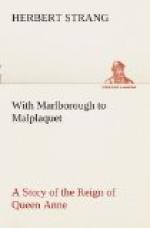13. FOOD AND DRINK
Tea was only just beginning to be known, and was a luxury for the rich. In London the coffee-houses were everywhere, playing a great part in the life of the capital, at least among those whom we should now call clubmen. The common drink was still beer, and, among the farm hands, milk. Port, till the Methuen treaty, was almost unknown in England. Even the gentry, as a rule, did not drink wine at ordinary times. The poorer classes rarely tasted flesh meat, except bacon, which latter cottagers in the country were generally able to command, every cottage having its pig. The best white wheaten bread was used by the richer folk only, the poorer eating coarse and dark bread, of whole-meal, of rye, or even of barley. Pewter was the ware in common use, except among the labourer class, who had wooden trenchers, or a coarse unglazed delft.
14. INDUSTRIES
The main occupation of the country was still farming, with fishing, shipbuilding, and seafaring on the coast. The manufacture of silk, woollen, and linen goods, now occupying so many millions of folk in the North and the Midlands, was then carried on mainly in the small towns and villages, or even in the lonely wayside or moorland cottage. The great manufacturing towns, such as Manchester, Leeds, Birmingham, and Sheffield are now, were nowhere to be found in the England of Queen Anne; but their day was coming. London was the great centre of the silk trade, and after it came Norwich, Coventry, Derby, and Nottingham. The cotton industry of Manchester and the surrounding towns in South Lancashire was making a start, while Leeds, Bradford, and Halifax, in the West Riding of Yorkshire, were just beginning to give their attention to the cloth trade on a larger scale. The trade with other countries was growing rapidly, Bristol being, next to London, the chief port. Hull, Liverpool, Southampton, and Newcastle were still small places. It is to be noted that the earliest notions of what we now call free trade are to be traced back to the days of the later Stuart sovereigns. Bolingbroke made certain proposals in that direction, but his plans were rejected by the Whigs. Stage-coaches began to run, the earliest being those between London and York, and between London and Exeter. A vast improvement in the high-roads soon came in consequence. The first General Post Office for the whole kingdom dates back to the reign of Queen Anne.
CHRONOLOGICAL LIST OF PRINCIPAL EVENTS
1702 (February 20). Queen’s Accession,
on the death of
William III.
War of the Spanish Succession begun (May). England, Holland, and the Empire against France and Spain: to determine the succession to the Crown of Spain. Two claimants, Philip, grandson of Louis XIV, and Archduke Charles of Austria, the latter supported by England and her allies.
Duke of Marlborough, in command of allied forces, took the strongholds of Venloo, Ruremonde, and Liege; France cut off from Holland and Lower Rhine. Marlborough made a duke.
Spanish fleet at Vigo captured by Sir George Rooke.




